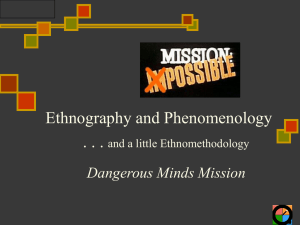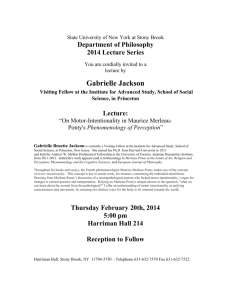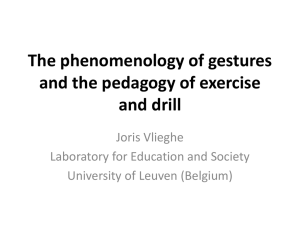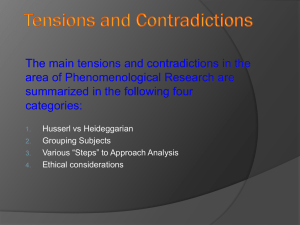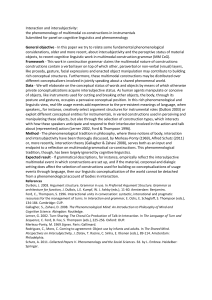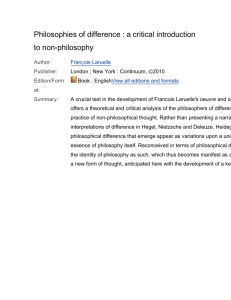CSCP-Program
advertisement
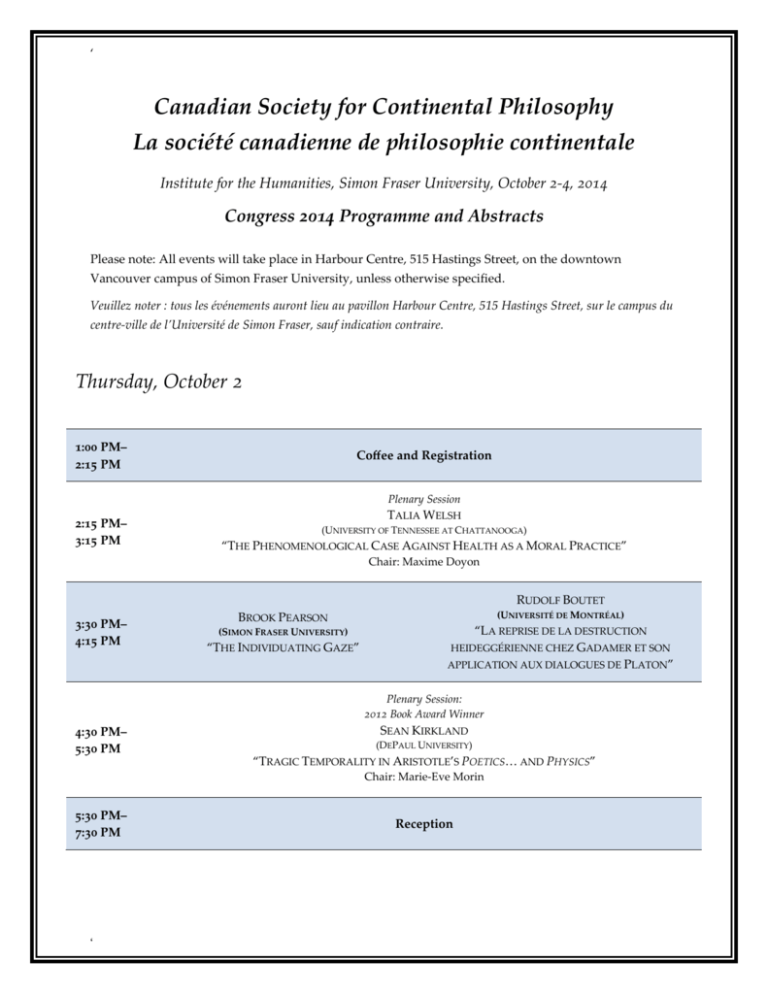
‘ Canadian Society for Continental Philosophy La société canadienne de philosophie continentale Institute for the Humanities, Simon Fraser University, October 2-4, 2014 Congress 2014 Programme and Abstracts Please note: All events will take place in Harbour Centre, 515 Hastings Street, on the downtown Vancouver campus of Simon Fraser University, unless otherwise specified. Veuillez noter : tous les événements auront lieu au pavillon Harbour Centre, 515 Hastings Street, sur le campus du centre-ville de l’Université de Simon Fraser, sauf indication contraire. Thursday, October 2 1:00 PM– 2:15 PM Coffee and Registration Plenary Session 2:15 PM– 3:15 PM TALIA WELSH (UNIVERSITY OF TENNESSEE AT CHATTANOOGA) “THE PHENOMENOLOGICAL CASE AGAINST HEALTH AS A MORAL PRACTICE” Chair: Maxime Doyon 3:30 PM– 4:15 PM RUDOLF BOUTET (UNIVERSITÉ DE MONTRÉAL) BROOK PEARSON (SIMON FRASER UNIVERSITY) “LA REPRISE DE LA DESTRUCTION “THE INDIVIDUATING GAZE” HEIDEGGÉRIENNE CHEZ GADAMER ET SON APPLICATION AUX DIALOGUES DE PLATON” Plenary Session: 2012 Book Award Winner 4:30 PM– 5:30 PM SEAN KIRKLAND (DEPAUL UNIVERSITY) “TRAGIC TEMPORALITY IN ARISTOTLE’S POETICS… AND PHYSICS” Chair: Marie-Eve Morin 5:30 PM– 7:30 PM ‘ Reception ‘ Friday, October 3 9:00 AM– 9:30 AM 9:30 AM– 10:15 AM 10:30 AM– 11:15 PM 11:30 AM– 12:15 PM 12:15 PM– 2:15 PM 2:15 PM– 3:00 PM 3:15 PM– 4:00 PM Coffee and Registration MAXIME DOYON (UNIVERSITÉ DE MONTRÉAL) MARTINE BÉLAND (COLLÈGE ÉDOUARD-MONTPETIT) “ACTION, PERCEPTION AND NORMATIVE SELF-CONSCIOUSNESS” “THE PHILOSOPHER AND THE MASSES: A STUDY OF A NIETZSCHEAN CONCEPT” TYLER KLASKOW (GRAND VALLEY STATE UNIVERSITY) TIMOTHY BROWNLEE “THE PERSUASIVENESS OF FORMAL INDICATION” “ALIENATION AND THE SELF IN HEGEL’S PHENOMENOLOGY OF SPIRIT” (XAVIER UNIVERSITY) DAVID MORRIS (CONCORDIA UNIVERSITY) PHILLIP HOMBURG (UNIVERSITY OF SUSSEX) “’EXISTENT GENERALITY,’ DEEP TEMPORALITY, AND BEING AS CREATIVITY IN MERLEAU-PONTY” “SYMBOL, SIGN AND FETISH” Lunch and Business Meeting (all are welcome) SCOTT MARRATTO (MICHIGAN TECHNOLOGICAL UNIVERSITY) AM JOHAL (EUROPEAN GRADUATE SCHOOL) “SOVEREIGNTY AND REVOLUTION: DERRIDA AND MERLEAU-PONTY ON POLITICAL AGENCY” “ECOLOGICAL META-POLITICS: BADIOU, ECOLOGY AND THE SUBJECT OF CHANGE” ALIA AL-SAJI (MCGILL UNIVERSITY) ODED ZIPORY (STANFORD UNIVERSITY) “FANON AND THE PHENOMENOLOGY OF RACIALIZED TIME” “’FORE ME, THIS FELLOW SPEAKS!’: RANCIÈRE AND EQUALITY IN POLITICAL SPEECH” Plenary Session 4:15 PM– 5:15 PM KYM MACLAREN (RYERSON UNIVERSITY) “INTIMACY AS TRANSGRESSION AND THE PROBLEM OF FREEDOM” Chair: Shannon Hoff 5:15 PM– 7:30 PM ‘ Dinner ‘ Plenary Session HOWARD CAYGILL 7:30 PM– 9:30 PM (KINGSTON UNIVERSITY LONDON) “THE CAPACITY TO RESIST” Chair: Samir Gandesha Saturday, October 4 9:00 AM– 9:30 AM 9:30 AM– 10:15 AM 10:30 AM– 11:15 AM 11:30 AM– 12:15 PM Coffee and Registration GARY FOSTER (WILFRID LAURIER UNIVERSITY) SUZANNE MCCULLAGH “SARTRE AND CONTEMPORARY MORAL PSYCHOLOGY” “SPACE AND THE INDIVIDUATION OF ACTION IN ARENDT AND DELEUZE AND GUATTARI” ROGER FRIE (SIMON FRASER UNIVERSITY) “RE-THINKING THE UNCONSCIOUS: HERMENEUTICS AND CONTEMPORARY PSYCHOANALYSIS” ‘ PIERRE LAMARCHE (UTAH VALLEY UNIVERSITY) “STUDIUM AND PUNCTUM OF THE BOSSA NOVA: BARTHES, BRAZIL, AND ELIS REGINA” JOSEPH KIRBY (INSTITUTE FOR CHRISTIAN STUDIES) BILGE AKBALIK (UNIVERSITY OF MEMPHIS) “BEING AND TIME IN SOLITARY CONFINEMENT AWAITING DEATH” 12:15 PM– 2:15 PM 2:15 PM– 3:00 PM (CARLETON UNIVERSITY) “A BODY OF TRUTH/A TRUTH OF THE BODY” Lunch DANIEL BRADLEY (GONZAGA UNIVERSITY) CHRISTOPHER PENFIELD “LIGATIO EX NIHILO: AN ALTERNATE PATH THROUGH THE DARKNESS OF KIERKEGAARD’S PHENOMENOLOGY OF ANXIETY” “FOUCAULT, KANT, AND THE CRITIQUE OF NEOLIBERAL GOVERNMENTALITY” (PURDUE UNIVERSITY) ‘ Plenary Panel PHENOMENOLOGY AND CRITICAL THEORY: ONTOLOGY, CRITIQUE AND AUTHENTICITY 3:15 PM– 5:00 PM SAMIR GANDESHA (SIMON FRASER UNIVERSITY) IAN ANGUS (SIMON FRASER UNIVERSITY) PEYMAN VAHABZADEH (UNIVERSITY OF VICTORIA) Plenary Session BRUCE BAUGH 5:15 PM– 6:15 PM (THOMPSON RIVERS UNIVERSITY) “QUESTIONING THE FUNDAMENTAL PRESUPPOSITIONS OF METAPHYSICS: THE ‘CRITIQUE OF REASON’ IN DELEUZE, SHESTOV AND FONDANE” Chair: Martine Béland 7:00 PM– Dinner Sign up at the registration desk by 5:15 on Friday for a common meal (each person pays his or her own way; space is limited) ‘ ‘ Abstracts / Résumés Bilge Akbalik (University of Memphis), “A Body of Truth/A Truth of the Body” This paper will engage several themes in Foucault’s texts that are pertinent to medical discourse, in an effort to depict a notion of somatic health crafted through a scientific discourse that operates with a conception of “truth,” which in turn manifests and justifies itself in a certain ethical discourse. Foucault uses the concept of “metasomatization” to refer to the ancestral body that is posited in an effort to provide an etiology of psychiatric disorders in the absence of a somatic cause. I will suggest that this concept, and the “metabody” as its artefact, could be employed in order to explain the prescriptive claims of contemporary medical discourse. Only insofar as medical discourse justifies its enunciative authority in its “objectivity” can it operate at a prescriptive level, regulating the conduct of the subjects with regard to their own bodies, without falling into the precariousness of moral discourse. I will claim that medical discourse can prescribe an “ethos” for individual subjects only on the basis of a certain understanding of “normality” which requires a reference point formed through metasomatization. Alia Al-Saji (McGill University), “Fanon and the Phenomenology of Racialized Time” This paper draws on Frantz Fanon's Black Skin, White Masks to ask after the temporal structures of racialized experience—what I call racialized time. In this vein, I analyze the racialized experience of coming “too late” to a world that appears predetermined in advance and the distorted relation to possibility—the limitation of playfulness and imaginative variability—that defines this sense of lateness. I argue that the racialization of the past plays a structuring role in such experience. Racialization is not limited to the present, but also colonizes and reconfigures the past, splitting it into a duality of times. While white time is constructed as open and progressive, the times of racialized peoples are read backwards as closed and anachronistic. To understand this colonial construction of the past, I look to the work of Latin American thinker, Anibal Quijano. Bruce Baugh (Thompson Rivers University), “Questioning the Fundamental Presuppositions of Metaphysics: The Critique of Reasons in Deleuze, Shestov and Fondane” Deleuze shares with Lev Shestov and Shestov’s follower Benjamin Fondane a critique of the fundamental assumptions of metaphysics. From Aristotle to Husserl, philosophers held that “first principles” can only be grasped through an intellectual intuition which apprehends them as self-evident, necessary and unchanging. Against this, Shestov and Fondane argue that the same degree of Evidenz can be found in emotions and sensory experience. Rather than particularity, change and difference being “illusions of the senses,” it is rather the categories of reason (being, unity, identity, substance) which are illusions based on reason’s “falsification of the evidence of the senses” (Nietzsche). Even the law of non-contradiction can be suspended when an individual is confronted by a vital problem which does not admit of any logical solution. The question is not whether to discard reason altogether, but rather: which is to be master? If the living being is to command, reason takes its proper place as one tool among others. Deleuze, Shestov and Fondane use rational argument to undermine the tyranny of reason, opening the door to “a new image of thought” which embraces contingency and chance, overturns “eternal values,” and makes “knowing” into creation and lawgiving, commanding rather than obeying. ‘ ‘ Martine Béland (Collège Édouard-Montpetit), “The Philosopher and the Masses: A Study of a Nietzschean Concept” Dans ses œuvres, Nietzsche a affiné l’opposition entre le « grand individu » et la « masse », définissant un individualisme aristocratique pour une société qui ferait place à l’individu. Mais une analyse de sa définition et de son emploi des concepts pour nommer la masse (ou la « populace ») montre que Nietzsche ne lui accorde aucun rôle politique. En m’écartant des angles à partir desquels la masse ou la populace, chez Nietzsche, ont été approchées (surtout dans la littérature anglo-américaine), je reviens dans cette communication à la manière dont Nietzsche a parlé de la masse : je m’arrête d’abord aux concepts qu’il emploie pour la nommer; je la décris ensuite en suivant les œuvres (du milieu des années 1880) où ces concepts interviennent le plus fréquemment et je précise ensuite la typologie qui en découle (et qui oppose la masse, le grand homme et l’individu), pour souligner leurs fonctions respectives au regard de la formation d’une nouvelle aristocratie. Je termine par quelques constats sur la dynamique entre le philosophe et l’homme de la place publique, pour souligner que Nietzsche oscilla lui-même entre différentes postures possibles pour qui se distingue de la populace. Rudolf Boutet (Université de Montréal), “La reprise de la destruction heideggérienne chez Gadamer et son application aux dialogues de Platon” Si on associe habituellement l’entreprise de destruction herméneutique, que projetait accomplir Heidegger dans les années 1920, à une tâche critique et avant tout négative, Gadamer, élève de Heidegger à cette époque, y a vu essentiellement une orientation positive vers une lecture des penseurs grecs s’effectuant en amont des fixations conceptuelles que leur aurait indûment imputées la tradition. C’est, soutenons-nous, cette possibilité positive de la destruction heideggérienne que met en pratique Gadamer dans ses lectures de Platon, notamment lorsqu’il souligne la dimension mimétique des dialogues platoniciens. Daniel Bradley (Gonzaga University), “Ligatio ex Nihilo: Original Sin and the Hope for Redemption” In pointing out the strange phenomenological structure of anxiety, Kierkegaard re-opens the door to reflection on the Nothing. This tradition has been fruitful, but it has remained wedded to interpreting this nothingness in light of the distinction between anxiety and fear. Thus, it has understood anxiety as the transcendence of this or that possibility towards an encounter with the freedom of possibility itself. However, Kierkegaard’s original formulation states that anxiety is “altogether different than fear and similar concepts.” In this article I take up that hint and argue that, interpreted in the light of guilt, Kierkegaard’s distinction reveals that while we may be guilty for this or that sin, in anxiety we stand before our sinfulness itself, and that anxiety, thus, ought to counsel us to resoluteness in the face of possibility, but also to a genealogical critique of our entanglement in the illusions of our past. Timothy Brownlee (Xavier University), “Alienation and the Self in Hegel’s Phenomenology of Spirit” In the Jena Phenomenology of Spirit, Hegel articulates a self-standing account of recognition. My central aim in this paper is to show that, for Hegel, recognition requires overcoming a condition of alienation (Entfremdung) arising from participation in social life. By means of a comparison with Althusser’s idea of ‘ ‘ “misrecognition,” I show that for Hegel the experience of alienation stems from participation in social institutions embodying an incomplete or false conception of the self. Since a shared and true understanding of the self is necessary for recognition, I argue that alienation renders reciprocal recognition impossible, and that the demand for recognition under conditions of alienation will only perpetuate the experience of misrecognition. My argument points to the centrality of the idea of “the self” to the achievement of reciprocal recognition. I conclude by stressing the importance of this centrality for social criticism. Howard Caygill (Kingston University London), “The Capacity to Resist” Resistance is an increasingly prominent form of political discourse and action which nevertheless remains largely unexamined philosophically. My talk will begin to redress this neglect by distinguishing between events of resistance and the capacity to resist, examining the development of the latter from Clausewitz through to the Occupy movements. I claim that the notion of a capacity to resist emerged from a specific contemporary interpretation of Kant's categories of modality and founded a line of radical political philosophy that deviates from the revolutionary tradition motivated by realising the idea of freedom. The talk will explore the peculiar temporality of the capacity to resist, its relationship to the diverse radical philosophies of revolution and reform and the relationship of the capacity to events of resistance. Maxime Doyon (Université de Montréal), “Action, Perception and Normative Self-Consciousness” Both philosophers of the Kantian analytic tradition like Sellars and McDowell and phenomenologists like Husserl and Merleau-Ponty agree on the necessary connection between perceptual consciousness and self-consciousness, and on the necessity to appeal to some form of self-conscious activity to account for the normative character of our actions and perceptions. However, they disagree on the nature of this connection. Whereas Sellars and McDowell insist on the necessity of ascribing a self-reference drawing on the linguistic and conceptual abilities of the agent, phenomenologists typically put the emphasis on the experiential dimension of self-awareness. This paper argues in favour of the phenomenological proposal, showing that the normative character of our behaviour ultimately finds its roots in bodily schematic processes. Gary Foster (Wilfrid Laurier University), “Sartre and Contemporary Moral Psychology” Much has been written about Sartre’s contribution to the field of psychology. His phenomenology as whole and his proposal for an existential psychoanalysis in particular, have contributed to the field of humanist psychology in general and existential psychology specifically. Less has been written however, about Sartre’s contribution to the field of moral psychology apart from the occasional analysis of his notion of “bad faith” and the use, by moral philosophers, of some of his colourful examples to illustrate a point. In this paper, I want to examine a particular issue in contemporary moral psychology in light of Sartre’s philosophy, more specifically, as he develops it in his early major work, Being and Nothingness. The issue that I wish to address is that of practical reason. I will focus on David Velleman’s discussion of this topic in his essay titled “The Possibility of Practical Reason.” ‘ ‘ Roger Frie (Simon Fraser University), “Re-thinking the Unconscious: Hermeneutics and Contemporary Psychoanalysis” This paper develops a contemporary hermeneutic perspective in psychoanalysis that begins with the work of the Swiss psychiatrist and philosopher, Ludwig Binswanger, and reformulates Freud’s notion of the unconscious from a contextualist perspective. Binswanger was the first to apply the philosophical works of Dilthey, Husserl and Heidegger to psychoanalysis. For Binswanger, the aim was not to make the unconscious conscious in the traditional Freudian sense, but to understand and open up possibilities of being and relating in the lifeworld. In contrast to the postulated interior mind, unconscious experience is seen as a vital part of a person’s ongoing contextual embeddedness. I thus maintain that the unconscious as an emergent and relational process and that unconscious experience is generated and maintained in social, cultural and historical contexts that implicitly shape and limit what we can know at any given moment in time. Phillip Homburg (University of Sussex), “Symbol, Sign and Fetish” In this paper I look at money from the philosophical perspective of sign and symbol. First, I examine Marx’s understanding of the money-fetish and the importance of a dual understanding of money as both arbitrary sign and necessary symbol. I then attempt to show a Marxian critique of Hegel’s money-sign from the Philosophy of Right in order to demonstrate the necessity of not dismissing the authentically symbolic quality of money. Finally, I conclude with some reflection on Walter Benjamin’s understanding of the symbol in order to elucidate an understanding of money as a quasi-religious symbol that gains its symbolic quality through its use in exchange. Am Johal (European Graduate School), “Ecological Meta-Politics: Badiou, Ecology and the Subject of Change” This paper brings Alain Badiou’s philosophical work on militant political change in to the contemporary question of Ecology. Building on Badiou’s work, it introduces Ecological Metapolitics as a philosophical term defined as the consequences a philosophy is capable of drawing from political project of Ecology as thought. It critiques democratic materialism, the limits of political philosophy, human rights, democracy and ethics. It proposes the use of affirmative dialectics related to the Ecological question today. It considers Ecology from the perspective of the Event, political change and the subject. Joseph Kirby (Institute for Christian Studies), “Being and Time in Solitary Confinement Awaiting Death” This paper traces Hume’s understanding of religion to his response to the despair and madness to which his philosophical project reduced him. I begin by drawing a parallel between Heidegger’s understanding of falling prey and Hume’s proposal to escape the “deepest darkness” by dining, playing some backgammon, making merry with his friends. Following this, I consider solitary confinement as an existential bellwether through which to explore what happens at the depths of anxiety. For Hume, who posits the domestic perspective of “honest gentlemen” as the normative standard, these depths cannot help but appear as undifferentiated madness. The testimony of those who have been there, however, indicates not one but two possibilities: one either finds sanctity and God, whatever this might mean, or ‘ ‘ one finds fear and brutality. I conclude by suggesting that contemporary secular culture, which still hearkens back to Hume’s approach, is still grappling with these issues. Sean Kirkland (DePaul University), “Tragic Temporality in Aristotle’s Poetics… and Physics” In this paper, I present a doubly unorthodox interpretation of the Aristotle’s thinking of temporality. On the one hand, I argue initially that Aristotle’s philosophical method (dialektikê) amounts to making a study of the initial appearances of its subject matter, i.e., a proto-phenomenological method. On the other hand, I approach Aristotle’s thinking of temporality not by reading the discussion of time in Physics IV.10-14 in relative isolation as is so often the case in scholarship on this issue, but instead by way of the Poetics. That is, I argue that the tragic temporality highlighted by Aristotle in the Poetics, the ecstatic exposure to an indeterminate past and future that characterizes the tragic protagonist, provides a lens through which we can and should view not only human praxis in the Ethics and Politics, but even natural being and kinesis in the Physics. Tyler Klaskow (Grand Valley State University), “The Persuasiveness of Formal Indication” The problem with communicating the findings of phenomenological researches is a consequence of the disclosive character of phenomenological descriptions. Phenomenological descriptions are supposed to be revelatory, coincide with the self-showing of the things themselves, and do no violence to the selfshowing of the phenomena. These features of phenomenological descriptions lead to the peculiar character of their expression. The peculiarity of descriptions’ expression has the effect of making them more difficult to communicate, not less so. Because of the peculiarity of phenomenological descriptions they are often listened to dubiously: since phenomenological descriptions use language idiosyncratically, even the most charitable interlocutors can doubt that they mean anything. This may be a problem for philosophy in general but it is a particularly acute problem for a descriptive philosophy. If we are not relying upon deductive argumentation––which can force the assent of the listener––we need to be sure we have a way of overcoming the listener’s doubts. In this essay I elucidate how phenomenological descriptions can be communicated and be persuasive. I argue that phenomenological descriptions are communicated as emptily intended expressions and because of this the listener can also be persuaded of their truth. To make the case I show that Heidegger’s method of formal indication is a form of philosophical communication designed to deal with the problems of sharing phenomenological findings. Pierre Lamarche (Utah Valley University), “Studium and Punctum of the Bossa Nova: Barthes, Brazil, and Elis Regina” It seems reasonable to suggest that sound recording, in its various guises, presents us with similar possibilities for reference – for eliciting the event in its intractability, i.e., I suggest, in its concrete particularity – to those that we find in the visual photograph, and that, as such, aural equivalents may be found for the optical studium and punctum that Barthes locates in the photograph, in his Camera Lucida. I want to explore this possibility through an analysis of a recording of a popular song from the Brazilian tradition of bossa nova; Águas de Março, composed by Antonio Carlos Jobim, performed by Jobim and vocalist Elis Regina, and recorded on February 22, 1974, in Los Angeles, California. ‘ ‘ Kym Maclaren (Ryerson University), “Intimacy as Transgression and the Problem of Freedom” Intimacy, Merleau-Ponty proposes, is always a transgression [empiètement] on the freedom of the other. And yet his accounts of child development and of love suggest that intimacy can also be that which promotes freedom and becoming in individuals. This paper seeks to articulate an account of what intimacy is, according to Merleau-Ponty, while also exploring the problem of freedom as it presents itself within intimate relationships. Drawing upon Merleau-Ponty’s understanding of intersubjectivity and intercorporeity, his account of freedom as essentially conditioned, and his notion of institution, it elucidates the claim that intimacy is transgression; it considers the inherent dangers involved in such transgression; and it claims that by responding to certain ethical imperatives internal to our intimate relations, it is possible (even if it is not always evident how) to help promote the genuine becoming and freedom of ourselves and our intimate others. Scott Marratto (Michigan Technological University), “Sovereignty and Revolution: Derrida and Merleau-Ponty on Political Agency” Making use of Derrida’s analysis of the logic of sovereignty, alongside Merleau-Ponty’s concepts of expression and institution, I offer, in this paper, an account of political agency. Contrary to emancipatory projects that aspire to challenge the logic of sovereignty as such, I argue that the logic of sovereignty is the basis of political agency, even of any conceivable form of revolutionary, or transformative, agency. However, I also underline Derrida’s argument that any sovereign act must be inscribed in a horizon of shared sense, meaning, or law, and is thus essentially exposed to the contestation of its own pretended authority. I will show that this aporetic logic of sovereignty exactly mirrors the logic of what MerleauPonty calls “expression.” I show how Merleau-Ponty deploys this logic in his discussion of revolutionary “praxis.” On the basis of this discussion, I draw some conclusions about the nature of transformative political agency. Suzanne McCullagh (Concordia University), “Space and the Individuation of Action in Arendt and Deleuze and Guattari” A great deal of focus in the history of moral and political philosophy has been placed on individuating actions in terms of the isolation, delimitation, and determination of the sphere or space of individual, human action. This paper explores the ways in which space and individuation is theorized in both Arendt’s and Deleuze and Guattari’s works, and the function of these concepts in their respective theories of action. Both sets of thinkers advance a view of action as non-sovereign and open to contingency that they articulate in correlation with conceptualizations of space and individuation. We will see that their ways of thinking individuation (what it is that ‘makes’ something an individual) and what is considered to be a “space of action” share important similarities and yet are different in ways that significantly alter how we are able to think about the sphere of action. David Morris (Concordia University), “’Existent Generality,’ Deep Temporality, and Being as Creativity in Merleau-Ponty” Phenomenology, as radical empiricism, depends on encountering generality in things themselves, what Merleau-Ponty calls “existent generality.” An enigmatic note from Merleau-Ponty reveals how it is ‘ ‘ possible to encounter such generalities via the movement and development of things. I clarify this by conceptualizing generalities as what I call “familials.” I defend this view against charges of nominalism by emphasizing that we access generalities only through the reality of a temporality we share with them. Phenomenology’s transcendental condition, to which phenomenology is responsible, is thus what I call a deep temporality that is radically contingent and beyond the temporality of constituting subjectivity. Phenomenology is thus responsible to something contingent that precedes what is now accessible. A kind of natality is thus in the nature of phenomenology, and in the nature that enables phenomenology. For Merleau-Ponty being itself is thus creativity, a point implicit in his concepts of être sauvage and être brut. Brook Pearson (Simon Fraser University), “The Individuating Gaze” Both Anti-Oedipus and Discipline and Punish, respectively, can be read as ‘versions’ of Plato’s Republic through the lens of Marx’s Capital (in different ways for Foucault and for Deleuze and Guattari). The individuating structure of Plato’s apolitical ideal city-as-self-controlled-individual has contributed to the possibility of the structures variously described by Deleuze and Guattari as the body without organs and by Foucault as the carceral archipelago. The primarily descriptive approach taken to political philosophy by these philosophers is necessitated in part by their arguments that philosophical models of power are easily subverted by power structures themselves, which, in part, is why the earliest and most powerfully influential model of the state-as-individual in Plato remains important in their modelling of contemporary society. Christopher Penfield (Purdue University), “Foucault, Kant, and the Critique of Neoliberal Governmentality” While much ink has been spilled in recent years on Foucault’s relation to neoliberalism, major disagreement persists on whether this relation should be described as antagonistic or sympathetic in nature. I will argue that Foucault’s relation to liberalism is best understood on the model of his relation to Kant. Doing so provides the ground for denying that Foucault was an apologist for neoliberalism in any sense, including Gary Becker’s theory of human capital, while accounting for Foucault’s apparent ambivalence toward liberalism in general. This reading of Foucault supports the position taken recently by Frédéric Gros, who draws the distinction between “economic” or “political” liberalism, on the one hand, and “critical” liberalism, on the other. By locating this distinction in Foucault’s relation to Kant, I aim to both deepen our understanding of Foucauldian critique and sharpen the view of Foucault as a critic of what he termed “neoliberal governmentality.” Talia Welsh (University of Tennessee at Chattanooga), “The Phenomenological Case against Health as a Moral Practice” The promotion of health and the fight against illness are seen as moral activities. In the last few decades an increasing body of knowledge documents not just the medical, pharmaceutical, and technological breakthroughs that fight illness and disease, but also how certain individual behaviors, diet and activity in particular, promote health. Such knowledge presents a set of shifting prescriptions for maximizing one’s health. Failure is a given since bodies are fragile and mortal, but the refusal to engage in such practices is seen as both irrational and immoral as one has a duty to care for one’s health at least so as not to be a burden to others. ‘ ‘ Continental philosophical work in biopolitics is an obvious source to question the validity of simple moralizing about health. In this paper, I turn instead toward phenomenology. I focus on two parts of the contemporary first-world experience of health. First, the hiddenness of the body from introspection and the subsequent need for using metrics, such as cholesterol levels read by blood work, and technologies, such as x-rays, to assess health. Second, I discuss the phenomenology of food purchasing that precedes food consumption for most people and what this means for proposed regulations of health practices. I conclude with a suggestion for the philosophical position that individual health behaviors are amoral. Oded Zipory (Stanford University), “‘Fore Me, This Fellow Speaks!’: Rancière and Equality in Political Speech” When speaking about politics, Jacques Rancière offers a radical concept of equality that is not given but assumed and then verified. Although it allows us to think of political change beyond the traditional tension of ends and means, Rancière’s view of equality as presupposition is too abstract and not easily applicable. In this paper I will try to specify Rancièrian equality, by analyzing his interest in the first retirement of the plebs from Rome, which he regards as “The beginning of our history”. By examining the plebeians’ appearance in various historical, literary and philosophical texts of Shakespeare, Brecht, Glucksmann and Foucault, I suggest that, for Rancière, equality is based on an equal capacity for political articulation and on the use of “words as tools.” I show that although this notion of equality may limit normative egalitarian politics, it offers the possibility of equality beyond the hierarchic logic of distribution and fairness. ‘
